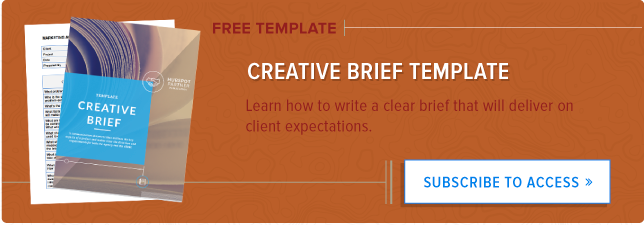
If you work in a creative profession, you’ve probably been approached at one point or another by someone who wants you to work for free.
They might offer some form of intangible benefit in return, like exposure or new contacts, but do these potential perks actually outweigh the negative aspects of not getting paid for your hard work?
We asked 10 agency leaders, consultants, and experienced freelancers to weigh in on this age-old debate.
Drawing from their own personal experience on the subject, they share their best advice on working for free below. See what they have to say and decide for yourself: Is working for free ever really worth it?
Is it Ever OK to Work for Free?
If you decide to work for free, put a smart process in place to make sure you benefit.
‘Strategically free’ is OK — where you explicitly choose to do free work because you benefit from it — but ‘secretly free’ is not. Here are my top tips as you’re starting out:
– Be smart. Make it clear to clients that they’re getting a special deal, and that you’re working for free because you benefit, too.
– Limit the scope of any ‘strategically free’ work — don’t write clients a blank check. For instance, you’ll do a specific deliverable, or you’ll work four hours a week for no more than one month.
– Get the terms in writing, with the client agreeing to do something in lieu of paying cash — for instance, confirming you can name their brand as a client, approving your using the work in your portfolio, serving as a reference, and/or providing in-kind services to you.
– Send ‘strategically free’ clients an invoice — for the total, discounted to zero. Even if they paid nothing, this helps reinforce that they received something of value.
– Karl Sakas, Agency Consultant at Sakas and Company
There’s a difference between working for free and demonstrating your ability free of charge.
It’s never okay to work for free. It sets the expectation your work is not worth paying for. However, it’s very useful to demonstrate your ability free of charge. Early off in any freelancing/agency career, you’ll be required to demonstrate some ability — and if you have no portfolio, this can be a challenge.
I would recommend putting together a collection of passion projects that demonstrate ability. Or, if you’re in a position to land a client, make a deck with examples of how you’d market the company, accompanied by relevant examples of your work in a nice short PDF. If the prospect likes it, they’ll seek out your services.
– Jordan Scheltgen, Founder and Managing Partner at Cave Social
If you work for free, you miss out on developing necessary business skills.
The fees marketers and freelancers charge should be in line with their experience, portfolio, and the marketplace’s demand for the service. If you’re early in your career and you don’t have a portfolio yet, charge a student or apprentice rate to clients.
When you don’t charge anything, your work isn’t valued. Part of being a freelancer is learning how to charge people and get paid. It’s just as important as the work you do, so get used to being a business person and charge for your work.
– Marilyn Heywood Paige, Vice President of Marketing at Fig Advertising
Free work can pay off in other ways besides monetary gains.
A few years ago as a young freelancer, I had two choices: do a few jobs that I was passionate about for free, or, not work at all.
A freelancer must ask him or herself: What does free really mean? Does building a site for a somewhat well known client who took a leap of faith working with you for free mean you aren’t getting anything out of it? Absolutely not. I’ve done a handful of free projects (I definitely don’t do them anymore), but each one benefited my business in some way.
– Chris Johnson, Co-founder at The Collective
If you’re seeking a permanent gig at an agency, working for free can give you a head start.
Working for free in the early stages of your career, particularly through college or university, shows a real work ethic to agency leaders, as well as a genuine drive and passion for what you do.
Agency work is an incredibly competitive job market, and a lot of the time it comes down to who you know. If an agency promises you industry exposure, access, and the opportunity to start building up a portfolio of work, the benefits to your career far outweigh the negatives of not getting paid.
My Content Specialist began as a freelance journalist, and also worked as an unpaid intern for a regional newspaper. It was his large portfolio of work that landed him his first job as a Marketing Copywriter.
– Steve Pritchard, Managing Director of It Works
Pick free projects for passion, not the promise of exposure.
There are situations where it is okay to work for free, but generally exposure is not one of them. The main reason here is that if a brand is not able to pay you, they likely won’t be able to actually get you a lot of exposure.
When is it okay to work for free? Passion projects. To me, that’s the only acceptable time to work for free. If you’re really passionate about a brand, a cause, or an event, by all means work for free if you must. A lot of these jobs will turn into paying jobs down the line as well. If they don’t turn into paying jobs, that’s why they call them passion projects! You followed your passion, and are hopefully a little better off for doing so at the end of the day.
– Tim Akers, Owner of Akers Digital
Instead of working for free, start your career by working for cheap.
It’s not okay to work for free 98% of the time, but saying never would be wrong. Usually the ‘exposure’ or experience or whatever is offered is not worth much — if this offer is even followed through on — and the offer is often coming from someone who doesn’t really value creatives or the work they do (and wouldn’t know good work if it hit them in the face).
I suggest working for cheap instead. If you are early in your career, charge a low rate that’s appropriate to someone with your overall experience and skill level. Build your portfolio and reputation, and raise your rate incrementally from there.
– Julie T. Ewald, CEO and Creative Director of Impressa Solutions
Free projects can help you build connections, as long as you remain wary of scope creep.
Early in your career, when you do not have a lot of connections and are looking to build a portfolio of work, it’s a good time to work for free. This enables you to showcase your capabilities and hopefully — at the same time — meet key board members at non-profits and/or others who could hire you.
But be careful to what you commit to. What they want you to do at the outset can change quickly over time. Instead of writing a press release, you could suddenly find yourself running an event, training an executive for a media interview, or even doing a full blown campaign.
If you have the time early in your career, you may not mind handling a lot of the responsibilities. New professionals and freelancers can certainly benefit from working for free. The trick is to not over-commit yourself, and set limitations before your involvement gets out-of-hand.
– Steve Turner, Managing Principal at Solomon/Turner Multimedia PR
Early in your career, use free work to develop case studies and new skills.
Early on in your creative/freelance career, I do think that in limited circumstances it is ok to work for free to 1) get experience and 2) if the client will let you use them as a public case study so that you can sign other work.
There is a very strong limit to free work though, and in my opinion should only be done for the above two reasons. Also, what I have seen work well for some consultants is to have one area that they do well and are being paid for (e.g., SEO consulting) and then to offer clients an additional free service in an area they aren’t yet an expert in to gain some experience.
– John Doherty, Founder of Credo
Free work is a necessity to get your creative career off the ground.
When you get started as a freelancer, you will almost certainly have to work for free at some point. Most clients and companies won’t trust a new freelancer with no reputation, or give them work until they prove themselves.
Once you have projects and references, you won’t have to take on these types of tasks anymore. Also, some opportunities for free work may arise that can be very beneficial to your portfolio, or might simply make you feel good for being involved.
If you are willing to do some of the work for free, it gives you exposure to a new client and also adds a project to your portfolio (one you might not have otherwise had the chance to work on).
– Mark Tuchscherer, President of Geeks Chicago
What do you think? Is it ever OK to work for free? Let us know in the comments.
![]()
Powered by WPeMatico






